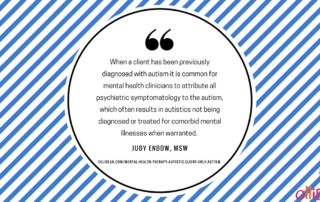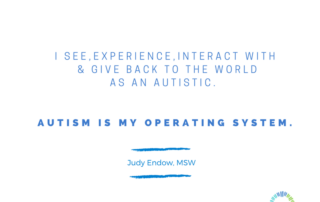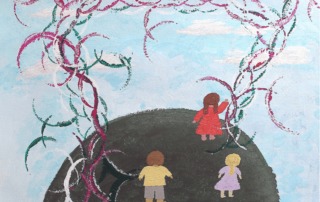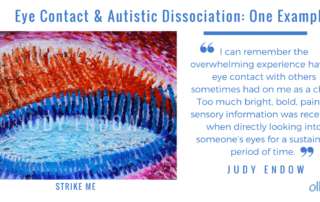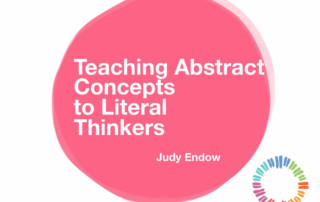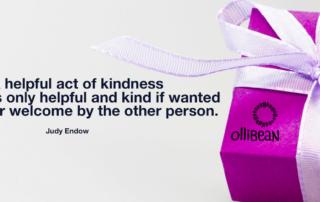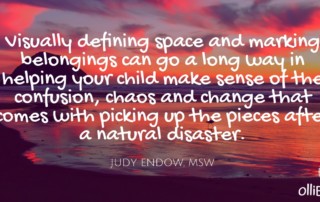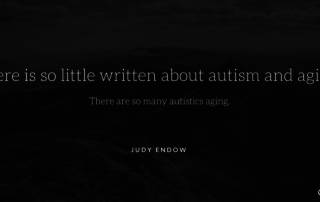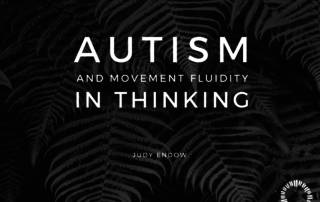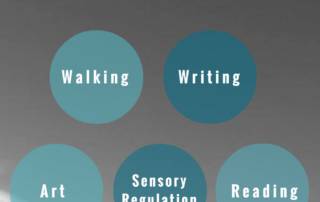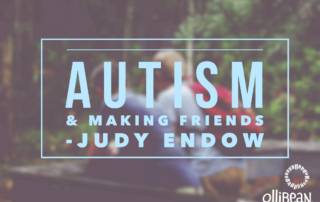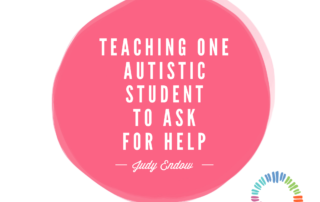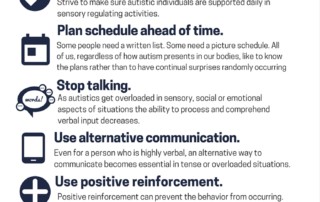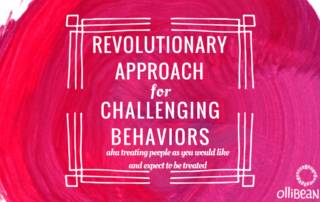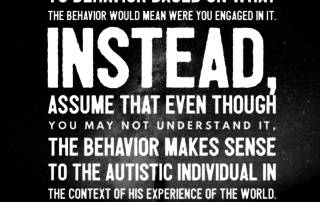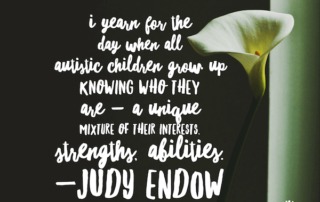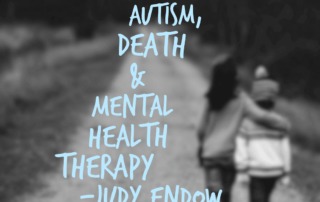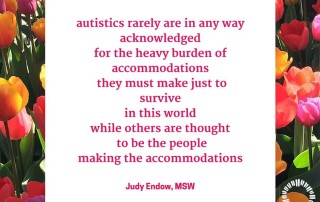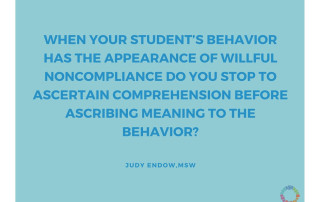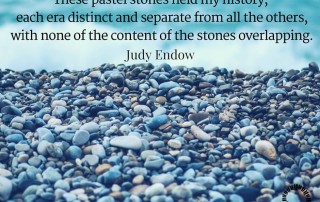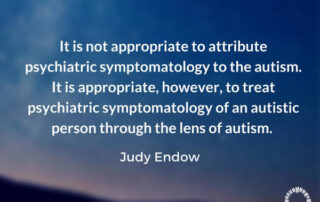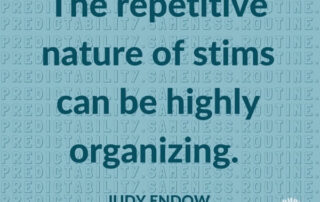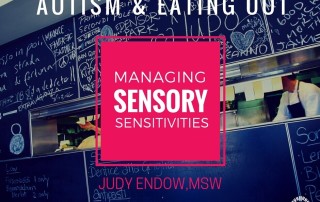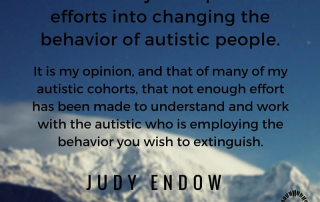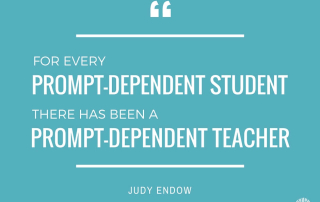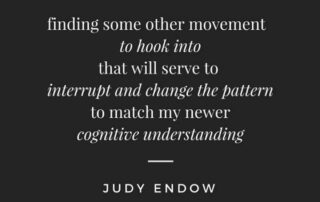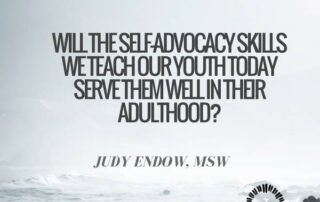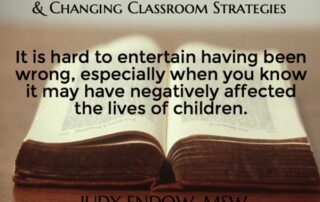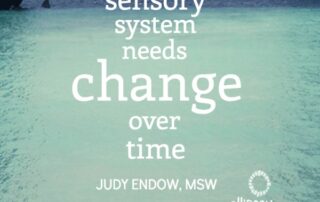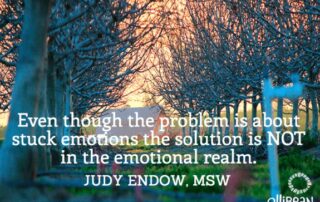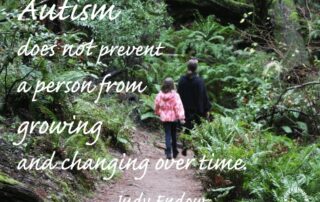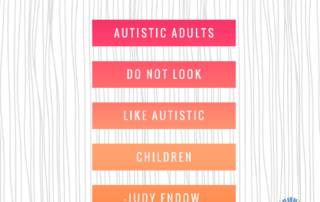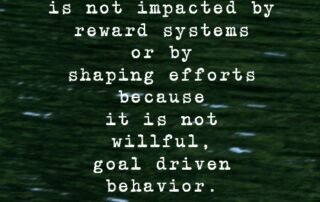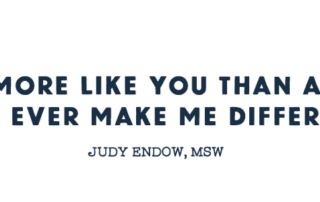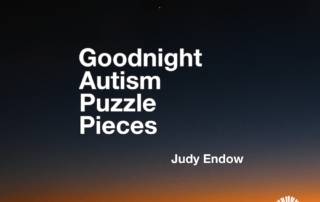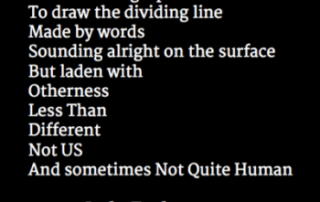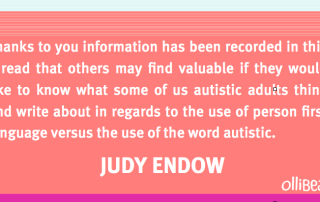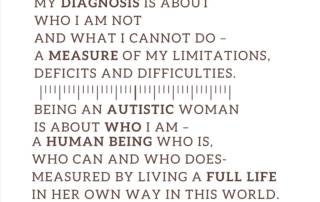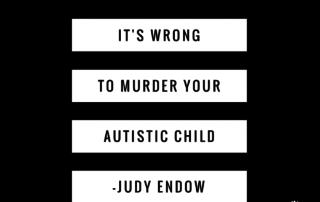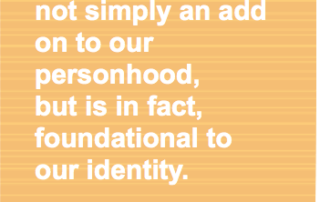Mental Health Therapy and the Autistic Client: When Clinicians Don’t See the Autism (It’s All the Autism)
When Clinicians Attribute All Psychiatric Symptomatology to the Autism Autistic people find their way to therapy when symptoms of depression, anxiety, OCD and other diagnoses become problematic to them in their daily lives. When a client has been previously diagnosed with autism it is common for mental health clinicians to attribute all psychiatric symptomatology to the autism, which often results in autistics not being diagnosed or treated for comorbid mental illnesses when warranted. As clinicians we need to understand the autistic operating system – in other words, to see the autism – if we are to be helpful to
Mental Health Therapy and the Autistic Client: When Clinicians Don’t See the Autism
A Series on Mental Health Therapy and the Autistic Client by Judy Endow, MSW When Clinicians Don’t See the Autism (Can’t See the Forest for the Trees) Today, autistic people, just like the population at large, find their way to therapy when symptoms of depression, anxiety, OCD and other diagnoses become problematic to them in their daily lives. As clinicians we need to understand the autistic operating system – in other words, to see the autism – if we are to be helpful to our autistic clients. When we do not have a strong grasp on this the results are
Mental Health Therapy and the Autistic Client: The Autistic Operating System, Part One
The Autistic Operating System, Part One Mental health diagnosis and treatment has evolved over time according to what makes sense and what works for most people. We have an increasing body of research around mental health issues that informs us today. However, when it comes to autistic people we do not have a body of research that informs us about diagnosis and treatment of mental health disorders. Autistic people are not like most people. This means we need to understand the underlying autism neurology along with its impacts in the realm of diagnosing and treating mental health disorders
Mental Health Therapy and the Autistic Client
By Judy Endow , MSW Mental Health Therapy and the Autistic Client: Establishing Context Background Information: The autism neurology gets hit with elements of confusion, chaos and change as a person goes through their day. How this happens is different for each individual on the spectrum. For example, Brady’s neurology startles to a touch on the arm, DeShawn’s neurology reacts adversely when it perceives a surprise change in the therapy room such as new curtains and Aysia’s neurology delivers a punch when her therapy routine was altered by Grandma bringing her rather than mom. Each of these individuals was abruptly
Toxic Autism Awareness
Toxic autism awareness - sorting out autism fact from autism fiction Judy Endow Autism Fact or Autism Fiction During the past week I have run into two different people in my personal life who have expressed erroneous beliefs about autism. Both people knew that besides being autistic myself, I am a therapist in the field of autism, have written many books and numerous blogs on various autism topics, and consult and speak internationally. Without a doubt, these people knew that I know about autism. And even so, they presumed their comments to be accepted fact so much so that they
The Advantage of Autistic Difference in Visual Perception
Autistic writer, artist and consultant, Judy Endow on autistic difference in visual perception. As a child, people sometimes thought I was stubborn and resistant when I did not want to allow them into my space or to do what they wanted me to do. They did not understand the negative effect they had on me and on my surroundings, and at the time, I did not have the words to explain it. Sensory Information and Perceptions Today I have the words and can explain. I do so in hopes that it might help others who may not yet have their
Eye Contact and Autistic Dissociation: One Example
Autistic writer, artist and consultant, Judy Endow on eye contact and autistic dissociation. Autistic Dissociation “Dissociation is the ability to cut off from what is happening around you or to you. In its simplest form it is daydreaming. It is a skill all children have and which children with autism tend to overdevelop in managing a world they find overwhelming for a whole range of reasons.” Donna Williams (Donna Williams at http://www.donnawilliams.net/333.0.htm) Overwhelming Eye Contact and Autistic Dissociation I can remember the overwhelming experience having eye contact with others sometimes had on me as a child. Too much bright,
Teaching Abstract Concepts to Literal Thinkers
Autistic consultant Judy Endow's strategies for teaching abstract concepts to literal thinkers. Teaching Abstract Concepts to Literal Thinkers During the holiday season people are sometimes rushed and frazzled due to the extra activities and expectations of the season. Thus, it is a particularly good time to talk about kindness. Many individuals with autism are literal and concrete thinkers, which can make teaching an abstract concept such as kindness a little tricky. Here are some ways to work with an autistic neurology when teaching the concept of kindness: Identify Acts of Kindness Even though kindness is an abstract concept we can
Why the Disability Community Is Grieving
11-9 by Judy Endow Our grief is deep. 11-9 feels so much to our disability community like 9-11 to our society. Our grief is deep. We are not being overly dramatic. Yes, 9-11 saw significant loss of life. Living, breathing people – lots of them – died that day. The reason those of us in the disability community feel this sort of grief today is because our human worth is on the chopping block. We know today that many of our friends, neighbors, fellow citizens out there in the community at large have voted against our humanity. For some
Disability Policy: Clinton versus Trump
In a few weeks will have elected a new President of the United States. Many of us get our information from watching TV. The trouble with this is we only get the information the TV decides is news worthy. Unfortunately, most things concerning disability are not newsworthy. This means that rather than seeing a candidate’s disability policy on the evening news we are more likely to see a candidate’s latest purported scandal whether it is about deleted emails or admitted past sexual abuse. While these things can be informative, I think it is helpful to also understand where the two
Providing Sameness and Routine While Living in Unfamiliar Surroundings
Judy Endow's Strategies for Providing Sameness and Routine Many children with special needs thrive in an environment with a high degree of predictability, sameness and routine. In the aftermath of a natural disaster life is anything but what our kids need to succeed. Often entire families, neighborhoods or communities are in the flux of confusion, chaos and change and will be for quite some time to come. Putting sameness and routine back into your child’s life as quickly as possible will be helpful. How can you do that when you have no idea what life will hold for you and your
Quick Tips to Create a Visual Schedule
Judy Endow on the Importance of Continuing a Visual Schedule After a Natural Disaster Many children with special needs use a visual schedule to organize their day. A visual schedule shows which activities and the order in which the activities will happen. A visual schedule can map out a big chunk of time such as an entire morning, afternoon or even a whole day. A first/then visual schedule shows what will happen just now (first) and what will happen next (then). (Endow, 2011) If your child uses a visual schedule it is important that you continue using a visual schedule through the
Autistic Burnout and Aging
Judy Endow Examines the Interplay Between Autistic Burnout and Aging Last week I returned from a vacation that I had been dreaming of taking for several years. I had booked my vacation quite a long time ago. After booking it, my personal resources declined. Many autistics know this phenomenon as autistic burnout. I am beginning to understand that there is likely some interplay between autistic burnout and aging . In autistic burnout we come to the end of our resources that enable us to act as if we are not autistic in order to meet the demands of
Autism, Direct Instruction and Having Friends
Autism, Direct Instruction and Having Friends by Judy Endow Social Understanding and Communication Social understanding and communication are two areas impacted by autism neurology. The way this plays out is different from one autistic individual to the next. Typically, for autistics I have worked with, this means that they do not always pick up social information from the world around them through observation only as most people do. Instead, they sometimes need direct instruction concerning information their autistic neurology doesn’t allow them to automatically pick up and learn. I think it is important that those around autistics understand that not
Autism and Movement Fluidity in Thinking
Autism and Movement Fluidity in Thinking by Judy Endow Unreliable Fluidity in Thinking One of the hardest things about my autism is the unreliable fluidity of my own thinking. Sometimes my thoughts are fluid and sometimes they are not. When my thoughts are fluid I can easily think through task-oriented things such as making a meal, writing an article, or cleaning the house. I can make a mental (or written) list and follow it. I can think of a main idea and sub topics. I can gather supplies and start. When my thoughts are not fluid life is a bit different.
Autistic Consultant on Autism, Making Friends and The Hidden Curriculum
Autism, Making Friends and The Hidden Curriculum by Judy Endow It can be difficult for some autistic people to sort out what things are okay to say and what things are not okay to say in various social situations. This was true for a high school student I worked with during the past year. William very much enjoyed talking with others, but was asking questions and making comments that were not appreciated by teaching staff. Worse, these comments and questions were causing other students to avoid him rather than include him in social exchanges. Each time teaching staff explained to
Autism, Social Greetings and Rhetorical Questions
by Judy Endow Autism and Rhetorical Questions Autistic people may not automatically know how to respond to rhetorical social questions such as “How are you?” or automatically reciprocate in social pleasantries such as “good morning.” This is not because they are rude, obnoxious, don’t care, or any of the other assumed reasons people attribute to this behavior. Instead, it is because all social information is not automatically picked up and used by a person with an autistic brain. The autistic brain simply works differently. Even so, autistic people can learn those things their particular brain hasn’t allowed them to automatically
Teaching One Autistic Student to Ask For Help
Teaching One Autistic Student to Ask For Help by Judy Endow During the past school year I worked with a third grader diagnosed with autism as he returned to school after being discharged from a treatment center. Jake displayed many behaviors that did not work well in the classroom. These behaviors occurred predominantly during math class. Jake’s scores in math were 82 – 90 percent over the previous quarter. With these scores, it did not appear that he was struggling in math. I discovered that most of Jake’s behaviors stemmed from frustration. Jake knew when he needed help, but
Autism and Consequences
by Judy Endow Autism and Consequences Sometimes a person with authority over another engineers a consequence for certain behaviors as a way to decrease the frequency of unwanted behaviors. One way people learn is from consequences. For example, if you leave your car parked outside with the windows down and it rains, the natural consequence is that your car seats will get wet. Sometimes a person with authority over another engineers a consequence for certain behaviors as a way to decrease the frequency of unwanted behaviors. For example, a mother or a caregiver might decide that if hitting occurs at
Autism, Behavior and the Impact of Kindness
Judy Endow on Autism, Behavior and the Impact of Kindness Please know that the behavior of people with autism makes sense in the context of their experience of the world around them. Because typical people do not share our context they are not often able to assign correct . They do their best by assigning meaning to our behavior based on what the behavior would mean were they themselves engaged in it the behavior. Often they arrive at wrong conclusions. Sometimes they even assign negative character traits to us based on their wrong conclusions. Example: As an autistic I can
Autism Awareness and Autism Acceptance
No more deficit based Autism Awareness. Autism Acceptance focuses on the strengths and abilities of autistic people.
Autism, Death and Mental Health Therapy
by Judy Endow The traumatic event of death is something we all struggle with from time to time over the course of our life. It is no different for autistic people. I am often reminded to be sure to identify exactly what the autistic person is struggling with when it comes to their particular circumstances. I am remembering youngster who had a pet gerbil that died and he didn’t want to part with the beloved gerbil. Three days after the gerbil had passed the pet was still in the little plastic exercise ball, which the youngster was carrying around with
Autism, Accommodation and Differential Expectations
People generally are very pleased with themselves when they have made an accommodation for me. I know this because they proudly announce it! In turn, I have learned to say thank you when people announce their thoughtfulness at making an accommodation for me. I truly am thankful because it allows me a fuller participation in the events going on around me. It also makes me smile because I have been making accommodations for people my whole life and it has never occurred to me to announce it!
Autism and Friendship
By Judy Endow For many years having friends eluded me. I find that to be true with many teen and young adult autistics. If you are in that predicament I encourage you to hang in there because it does get better over time. One of the hardest things we have going against us as autistics is that it is generally non-autistics who try to help us to have friends. The only way they know how to help is to try to get us to make friendships work in the way they make them work based on the way their neuromajority
Autistic Visual Thinking Impacts Comprehension
by Judy Endow I think in colors. My thinking colors have sound and movement. When I hear spoken words my neurology automatically goes for the match – a match for the words I hear to a familiar concrete picture of something in the world outside my skin or to an internal picture I have stored in my memory. . When I was a girl I heard the saying, “I got the world by the tail.” Immediately, the matching pictures of my experience of the world popped up for me to see. I found the best match and promptly assigned
Autistic Neurology or Psychiatric Symptomatology?
by Judy Endow Sometimes autistic neurology – specifically our style of thinking and the way our brain handles information bumps up against what can appear to be psychiatric symptomatology. This has happened to me many times over the years. My style of thinking is visual along with being quite literal and concrete. I understand myself and, in general, thoughts, ideas and concepts by having or creating an object or visual representation of that construct. Here is an example: “…in my life, I have come to a fuller understanding of the parts of me as represented by actual pastel colored
The Predictability, Pattern and Routine of Stimming
by Judy Endow The neurology of a person with autism does not automatically organize the world outside their skin. When we are able to organize the happenings in the world we usually do so differently than neuro majority people. As a young child I saw over and over how light from the sun interacted with water particles rising from the ground and with water droplets in the air. This repeated experience became useful over time in that I learned the predictability of this occurrence. I also learned the effects of various factors (such as clouds, rain, air temperature, wind,
Autism and Eating Out
Autistic author and consultant, Judy Endow, shares strategies for managing sensory sensitivities when eating out.
The Hidden Rules of Christmas
by Judy Endow Christmas will soon be here again. There is much about Christmas I love. There are many things about Christmas that took me a very long time to figure out. This is because my autistic brain doesn’t work in a way to automatically allow me to pick up social information that others expect me to know. This expected social knowledge is called the hidden curriculum. It is the information that everybody knows – everybody except people like me! During the Christmas season there are generally more social gatherings to attend than in everyday life. These gatherings are
Fear, Anxiety and Autistic “Behavior”
When it comes to autism and "behaviors" it's better to understand and work with -- not on--the autistic person who is employing the behavior.
Autism, Visual Schedules and Prompting
Verbally prompting each step of a sequence isn’t an expedient way for many students with autism to learn routines.
Autism and Public Perception
Autism and Public Perception by Judy Endow Today we have added something to our public perception of autism. Historically that perception has been one of an isolated small child rocking or head banging, oblivious to the rest of the world. Even though that perception is wrong, it is the public perception. There is an addition to that perception in the past few years. It seems society has added an adult image of autism. It is another false image, but never-the-less, quickly becoming an accepted public image of what it means to be an adult autistic. Unfortunately for
Autistic Patterns of Thoughts and Emotions
I use the movement of things outside of me for purposes of thinking and of processing feelings. Recently, autistic friends have let me know that most people in the world do not do this and that it is a rather common autistic experience. I have no idea how common so would very much appreciate autistic weigh in here. Thinking My thoughts are all in colors and pictures. Usually there are sounds attached, but not always. To think I need a way for the colors and pictures to move. When my sensory system is calm and integrated the thoughts
Autism, Transition Programs and the Impact of Poverty on Self-Advocacy
I am an autistic woman who has lived both in poverty and as a middle-income person during my adult life. I am noticing how self-advocacy is typically geared toward middle-income status. This could be problematic since many autistic adults live in poverty. Based upon my experience I have come to realize that middle class self-advocacy works fine if in fact you are a middle-income person, but doesn’t work well if you are a poor person. I will explain this more using an example from my life as a poor person versus a middle class person. Dental Experience as
Visual Accommodations and Blessings of My Autism
The visual sensory aspects of the way autism plays out for me most of the time means that I get too much information delivered – things are too big, too bright, too bold – typically too much to endure all day. Practically, this means I need to accommodate my sensory system in a variety of ways. Let’s take but one example from my life where visual overload is a pretty constant problem. Here are some things I have found helpful: Environmental Accommodations for Overhead Lights Most of the time I simply do what I need unless it
Autism and Changing Classroom Strategies
The field of autism is very new – not even 100 years old yet! This means we are constantly learning new things. We now know that what works for most children to learn does not always work for autistic children. In fact, it can be detrimental to their learning. Those of us in the field of autism will likely need to change the way we deliver help to those who seek it and change the way we teach our students.
Autism and Processing Social Information
My autistic neurology means that I am not good at picking up typical social cues, understanding complex social situations, automatically picking up meanings of idioms, or understanding the hidden curriculum that most others automatically pick up (Endow 2012). This means I often look naïve and gullible. The fact is I AM naïve and gullible when I try to use the social constructs of neuromajority folks to navigate the world around me. When I was younger and deemed “in need of help” that “help” largely involved others trying to teach me to think and act as if I had a
Autism and Stubbornness
I am an autistic woman. Most of my life people have let me know they think I am stubborn and controlling. Over time I have learned to hide the behaviors so people do not think I am stubborn and controlling. I understand you view my stubbornness as a bad thing so I have learned to hide it. Today I would like you to consider that what you label as stubborn and controlling is often a solution to help us manage our anxiety and fear. Whenever we have a fearful or anxious moment – and those moments tend to
Autism and A Changing Sensory System
Something about autistic sensory difference that I do not see addressed in the literature is the fact that sensory system needs change over time.
Autism and Non-Fluid Speech
I am a speaking autistic woman. Even so, I rarely have fluid access to my speech. Often times I have in mind something I would like to discuss with a friend so as to get their thoughts and ideas on the topic, but even though I know what I want to discuss the words are not available as speaking words. Oh, I know the words – they are in my head – I just cannot get them to come out of my mouth at will. This often poses difficulties for me. One example is when I am with my
Autism and Visual Detail
Because of my autism I often experience sensory overload. Many times this is painful. I have learned that by keeping my sensory system regulated I can avoid some of the pain. Over time, in the process of becoming more regulated, I have found ways to enjoy my unique sensory system. One of the things I enjoy is a degree of beauty I can see in many things around me. I don’t think neurotypical people often see the detail I do. The reason I think this is because when I comment about something beautiful I am seeing others often do not see it. Sometimes
Autism and Hiring Help
I recently moved. It involved working with a realtor, a banker, and numerous other people. Today I am contemplating sorting out what to put into my new desk drawers and have a literal pile of paperwork from various aspects of my moving adventure. As each person representing each faction of moving began working with me they explained what they would do, how they would do it and the expected outcome. For example, the furniture store guy explained how the sale worked, the ordering and delivery of the furniture and the return policy. I asked my questions which were answered
Autism, Sensory Regulation and Movement Fluidity
Many any individuals with classic autism seem to have neurological movement differences. When these movement differences play out in our bodies, it is easy for onlookers to see, as we may get stuck in one position or in repetitive movement. Sometimes there can be difficulty in getting a body movement going, and at other times once our body is in motion, we cannot stop even if we want to. These movement differences can also play out in thoughts, speech, and emotions, areas that are not as readily observable to onlookers, yet can be daily obstacles to outsmart for some of
Autism and Stuck Emotions
It has taken most my lifetime for me to begin figuring out stuck emotions in relationship to my autism. In discussing this with other autistic adults I have discovered many share this problem. Some describe the stuck emotions as being shut down. There are variations of experience, but there seems to be a shared experience of stuck emotions in autistics. Everyone I have discussed this with agrees that stuck emotions are quite difficult to deal with and, in fact, have led to much misunderstanding and sometimes to psychiatric hospitalizations. Even though I have been talking to other autistics about this
Autism, Inflexibility and Diversity
A universal assumption about autism is that autistic people tend to be inflexible and it is NOT GOOD to be inflexible. Let’s take a look at that assumption. Neuro majority people talk a lot about the inflexibility and the rigidity of autistic people. Seems like they get stuck in that train of thought. Isn’t it quite a narrow perception to believe that everyone should be just like you and should conform to your ways? And yet, as an autistic, if I want to get anywhere in the world I need do just that - to conform to the ways of
I Paint to Share My Autistic Experience
I started painting with acrylics in 2012. I wanted to use that medium to illustrate aspects of my autism. To date I have written several articles and books along with speaking in three countries about aspects of autism. Painting is one more way to explain some of the nuances of autism to those who might be interested. Painting allows me to show perceptions of the world that I see with my eyes as delivered through the neurology of my autism. I match up what I see with the colors and movements of paint on canvas paper. I have not taken classes
Autistic Adults Do Not Look Like Autistic Children
I recently presented to a room full of people on the topic of Autistic People and Literacy. A few days later I again presented to another group of people on another autism related topic. It doesn’t matter the autism topic or whether the group I am presenting to be educators, therapists, or parents of children with autism – I am almost always approached by someone wanting to know how it is that I do not look or act anything like the autistic children they know. There are many reasons autistic adults do not look like autistic children. Here are some
Outsmarting the Hard of Autism to Attend Live Theater
I love musicals and other live theater performances. About five years ago I googled the name of the performing arts theater in my town along with “season tickets” and was delighted to discover the possibility for a whole new adventure! My friend Marilyn and her adult son Jimmy (who also likes musicals and has autism) decided they would like to do this too. Each year I am the person who sends out the information on shows and orders the tickets for all three of us. Along the way we had to outsmart the hard of our autism and figure out
High-Functioning or Low-Functioning?
In this life I am missing the ability to go out into the world and just be accepted for my natural autistic self. I must inhibit so many of my natural responses just to fit in enough for others to allow me a place in the world. I have discovered that to have a place in this world I need to fit into it in a way that makes sense to the majority. For me, this isn't a good or a bad thing - just merely the way it is. Fitting into the world is something I need to balance
Autistic Pride
This week someone asked me if I was proud to be autistic. It made me think about pride in general and about the term autistic pride. In general, feeling proud of myself is not something that is front and foremost in my life. When I think of who I am, words like female, adult, Dutch, heterosexual, white and autistic come to mind. None of these things are anything I am proud of or not proud of – they are simply words that describe me. I think of it as a launching pad. This is my originating place from where I
Autistic Meltdown or Temper Tantrum?
Autistic meltdowns and temper tantrums are not the same thing. Autistic meltdowns typically occur as a response to being overwhelmed.
The Pseudo Logic of “Not Autistic Enough”
Recently, I was told by a parent of a child on the autism spectrum that I am "not significantly enough affected by autism to be able to understand real autism" and therefore should stop speaking out about autism. Some aspects of my personal history (Endow, 2009) that you may find interesting include: Was nonverbal for some time Had self-injurious behaviors Lived in an institution for some years of my childhood Lived in two different groups homes Diagnosed with classic autism I understand that as a parent of a child with significant needs you may look at me and look
In Sidewalk Cracks: Authentic Relationships
In Sidewalk Cracks: Authentic Relationships In life we play on sidewalk squares. You on your NT sidewalk square You jump to my square to help me out (and so does everyone else) That I need all the help you can give. You teach me to copy your ways. I jump to your square and copy you. You are happy because I am learning To copy your ways in the world. All I have is you helping me And me copying your ways. Is it a wonder the feeling of alien predominates? There is more to jumping over the sidewalk crack.
Autism and the Importance of Stabilization
As an autism consultant I am often asked how I sort out what to do when I see an autistic client who is struggling in school or in life. As an autistic person I know first hand if stabilization needs are not met, regardless of the supports in place an autistic person will struggle. Stabilization consists of three areas that interplay – internal and external regulation in the context of a positive relationship. Internal Regulation ~ Sensory Diet Internal regulation has many components, but for stabilization I look at the sensory system. When a person has an autism neurology
An Autistic Weighs in on Friendship
I am a professional person who works as an autism consultant to various school districts when I am not speaking and writing. I have an autism neurology myself so I enjoy the privilege of being able to see and experience autism from a variety of viewpoints. One thing that greatly pains me is the continuing wrong assumptions professional people make about autistics and how those wrong assumptions often get interpreted as fact.
Autism and Holiday Schedules
Autism and Holiday Schedules by Judy Endow As an autistic getting through the holiday time can be quite tricky. As an autistic parent with children who had different needs it was even trickier. Routine and structure can go a long way! They anchor the days that can otherwise be perceived by an autism neurology as totally chaotic, which in turn, often leads to being overwhelmed and experiencing meltdowns. 1. Start by creating a visual schedule. You can simply use paper and pencil or use an iPad or computer to make your visual schedule. Words can
Autism and Sorting Out Sensory Snags
All my life I have been easily overwhelmed by sound and motion. I can hear things nobody else even notices such as the hum of electric devices that are plugged in even when the appliance or device is not in use such as the coffee maker on my kitchen counter. I can hear fluorescent lights hum, the steady grind of ventilation systems in buildings and the crackling from inside my television when it is muted. When I am in the midst of much movement I tend to get dizzy. This is really distracting because I am in busy places when
Communication Supports for Speaking Autistics?
As an autistic, I know first hand how my communication abilities are different from the neuro-majority people around me. Most people do not understand my differences because I can speak. On the surface my communication abilities appear normal. This make it very difficult for people to understand when I need accommodations they are just that – accommodations – not personal preferences. For example, even though I can speak to crowds of thousands of people my neurology does not permit me to engage in telephone conference calls in a meaningful way. The most I can do is listen, but after a
Autism and Eye Contact
A challenge I am continually faced with as an autistic adult is the misinformed presumption and resulting behavior of neurotypical people when I do not look at them the in way they expect, want or demand of me. It is challenging because society has put the onus on me to change. Often it does not matter to others why I am different. They just want me to stop being different. Recently I was told directly, “If you want to be treated like a real person then act like one!” Eye contact can be hard for autistics for a variety of
Autism, Differences and Murder
Ever since the not guilty verdict in the George Zimmerman trial and more recently, after a police officer shot and killed Michael Brown, I have been and continue to be very much afraid in the pit of my stomach. The not guilty verdict and the dragging on of the no fault attitude in Michael Brown’s shooting underlines the fact that in our society it is perfectly ok to track down, shoot and kill someone perceived to be acting different. We fear people who are different from us. Differences come in many forms. If you are White then someone Black is
Speeding, Autism and No Ticket Issued!
In the past few years I have had two encounters with the police while driving my car. The first time I pulled into a school parking lot, answered an email on my Blackberry, gathered my stuff together and let out a little scream, as I didn’t expect to see a police officer standing at my car door! “Good afternoon officer. How might I help you?” I inquired, knowing that it is very important to always be polite to a police officer. “Do you know why I am stopping you?” “No, I do not,” I replied honestly. “Do you know the
Visuals and Back to School Transitions
Our kids went back to school this month and likely many families are still struggling with the transition. It often seems that as the newness wears off, the getting-down-to-business-struggles begin. Autistic students have a particularly challenging time because their neurology does not permit them to automatically organize the world around them. Teachers and parents can support a child with autism to become more organized. For many it is an essential accommodation so they can be in a place to learn. Autistic students are often visual learners. This means that even though they may be verbal, as stress increases comprehension of
How To Outsmart “Inflexible Thinking”
Because of my autism I have an autistic thinking style. One characteristic often attributed to me is “inflexible thinking.” Flexibility in thinking has to do with being able to adapt when circumstances change by adjusting or shifting from one expectation to another. This has never been easy for me, but I have learned how to live more comfortably with my autistic thinking style in a world where flexibility is much more highly valued than my inborn trait. First, I had to accept my own autism and the fact that I think differently (Endow, 2009). Self-acceptance doesn’t come easily for most
Supporting Autistic Relationships
As an autistic my connections to other people are perceived visually. In fact, I often need to have a concrete visual available in order to be able to think about my friends. A challenge I am often faced with is the erroneous presumption and resulting behavior of neuro-majority people when I need a visual in order to maintain a relationship. Many Autistics Are Visual Thinkers For those of us who are visual thinkers it seems logical that visuals would play an important part in developing relationships with others and in maintaining those relationships over time. In fact, many of us
Creating Visuals Instantly for Unpredictable Activities
As an adult with autism, knowing what will happen during each day is important to me. For children, who have much less life experience, it is often a deal breaker in terms of them being able to participate in life around them. Using visual schedules supports this need both at school and on ordinary days at home, but what about those times when life gets hectic or when spontaneity is in order? Why Visuals Work Having an autism neurology means that neither internal regulation (physical, sensory, emotions) nor external regulation (making sense of the world around us) just happens! We
Fractured Vision: One Autistic Phenomenon
I started painting with acrylics in 2012. I wanted to use that medium to illustrate aspects of my autism. To date I have written several articles and books along with speaking in three countries about aspects of autism. Painting is one more way to explain some of the nuances of autism to those who might be interested. Painting allows me to show perceptions of the world that I see with my eyes as delivered through the neurology of my autism. I match up what I see with the colors and movements of paint on canvas paper. I have not taken classes
An Odyssey: Learning the Hidden Curriculum
Learning the hidden curriculum social rules of society remains a struggle for autistics long after they grow up. For example, even though I am an almost 60-year-old woman with autism, over the past few years, I have learned a lot of new-to-me hidden curriculum items. The hidden curriculum refers to all the social information that everybody seems to know but isn’t directly taught to anybody. Here’s an example: Don’t scratch your privates really means don’t let anybody see you scratch your privates. Guessing at Hidden Curriculum Rules Once I amassed a volume of hidden curriculum items I began being able
Autism and Thinking with Colors
I think in colors. My thinking colors have sound and movement. When I hear spoken words my neurology automatically goes for the match. When I was a girl, I heard the saying, “I got the world by the tail.” Immediately, the matching pictures of tail started popping up in my head. It’s like having a personal version of Google Images. The initial picture search produced a variety of tails of animals. Then, there came the images of the ground mist I saw each morning when I went outdoors after breakfast. I assigned the world tail words I heard to this
Autism, Growing Up and Defining Friends
As an autistic, I have difficulties in the social arena in a multitude of ways. This was especially true during my growing up years. Even today as an adult, automatic social understanding is not my strong suit. I am, however, able to continually learn new things that enable me to do and be all I want in this world. Today, in my professional work I am able to provide some input to a variety of organizations and schools in regards to individuals with an autism label. One thing I consistently see regardless of where I go is the practice of
Autism, Airports and Lifelong Learning
For most of my life airports have befuddled me. It didn’t so much matter earlier in my life because the only time I used an airport was to go to visit my parents in another state. Back then, before we had the heightened security of today, people were allowed to meet passengers as they stepped off the plane which allowed me to simply follow them through the airport without needing to concern myself with the confusion all around me. In My 40’s Then, airport security changed. People picking up passengers could no longer go through the security checkpoint. I
Autism and Psychiatric Diagnoses
At different times during my growing up and even during my adult years autism wasn’t something people knew much about. I often came in front of mental health professionals. It is important to know that if you go to a mental health professional or take your child to a mental health professional in all probability you will walk out with a diagnosis of a mental condition as found in the DSM-5 – otherwise known as the Diagnostic and Statistical Manual of Mental Health Disorders In my adult life I obtained a master’s degree in social work. I did clinical work
Is Autism a Disability or a Difference?
So many ideas in the larger autism community often become a debate. As an autistic this black-or-white, choose-your-side sort of thinking is very neurologically friendly to me. I like clear choices. But I also believe we are often unwittingly duped into believing we need to choose a side only because the idea is presented as a dichotomous choice. “Is autism a disability or a difference?” is one of these questions posed as a dichotomous choice in the autism community. The way the question is posed gives the impression that there is one correct answer. When Autism is a “Difference” Many
Losing an Autism Diagnosis
I am an almost 60-year-old autistic woman who can navigate the world in a way that surprises some people when they find out I have autism. My teen years were spent in an institution because people did not know what to do with my “behaviors” or with me. Today I am a self-employed author, speaker, consultant and artist with a master’s degree in Social Work. Question: Did I lose my autism diagnosis? Official Answer: Yes and No No, an Autism Diagnosis Cannot Be “Lost” Technically, once a person is diagnosed with anything that diagnosis becomes part of their medical records.
April is Over!
Another April has passed – big sigh of relief! As an autistic I have a love/hate relationship with April – the AUTISM month. I love that increasingly more people over time have become aware of autism. I hate that Autism Awareness month contributes daily to many negative stereotypes of autism, most of it by people meaning to do something good on behalf of autism. As an autistic, I am meant to be grateful to all these wonderful people who are sacrificing their time, talent and money to be helpful to people like me. Some of the time I am grateful, but
Skunk Hair, Autism and Social Understanding
There is a saying, “love makes the world go round,” but for real it is NOT love. Instead, it is hidden curriculum that makes the world go round! Hidden curriculum is all that social information that most people know even though they were never actually taught it. An example is the rule “don’t pick your nose” with the hidden curriculum being it is perfectly fine to pick your nose as long as nobody sees you doing it. Many people with autism have difficulty with hidden curriculum. Their brains are not wired to allow them to automatically pick up this untaught,
More Than An Autism Diagnosis
I am an adult with autism. My thinking is visual rather than word-based. Autism gifts me with a literal and concrete way of thinking. My thoughts are all in full moving color. You can read about this and about my life in my book called Paper Words, Discovering and Living With My Autism. (Endow, 2009a) “Always, I have a front row seat to watch the show! Each color, with its infinite variety of hues and brightness, has its own movement patterns and sound combinations. Even though spoken words are the medium most often used by people to communicate with me, I
Goodnight Autism Puzzle Pieces
You may like lighting it up blue or using puzzle pieces as a symbol of autism awareness. I personally no longer like either of these things for lots of reasons and I post various blogs and articles about these topics in social media venues. My opinion, even though it may differ from yours, does NOT mean my autism is preventing me from understanding your point of view. It simply means we have different points of view. Yesterday I had a conversation in social media with a woman who explained all the reasons the puzzle piece symbolism was important to her
Treat Others As THEY Want to Be Treated
I was taught to treat other people the way I want to be treated. This works out great when I am with autistic friends because we share an autistic neurology. It does not always work out well when I am with everyone else who populates this world from a neuro-majority place of being. Therefore, the onus has been on me to figure this out for myself. It has taken many decades, but I have finally worked it out in a way that allows me to live more comfortable in a world largely populated by folks who do not share my
“Sucking It Up” To Pass as Non-Autistic
Image description : Blue square with back text:"I look forward to autistics having everyday lives with things so many take for granted – going to school, being part of the community, having meaningful jobs with living wages along with meaningful relationships. Judy Endow on Ollibean It is a lot of work to look non-autistic, and yet, looking non-autistic is the ticket to sit at many tables. It is not right, and yet, I choose to expend a great deal of energy inhibiting my autistic ways for the sake of sitting at some of society’s tables. Employment is one such table.
Crossing Sign Conundrums
Over the course of my life I have seen many kinds of crossing signs. When I go to a college campus I drive past a wildlife sanctuary where a duck crossing sign is posted. Each spring mama ducks line up near their sign and lead their babies across the road while the cars waited. There were lots of ducks and some days the wait for motorists can be up to ten minutes. Every winter when I drive along a county highway to visit a friend I see a snowmobile crossing sign. A snowmobile trail is on one side of the
Over 50, Autistic & Still Learning!
Yesterday I went to the Genius Bar at the Apple Store near my house with my laptop. It reminded me of just how far I have come in regards to technology in a few short years. It is hard to believe that I lived a half century on this planet before becoming versed in sending and receiving email! In 2005, my oldest, David, set up a Hotmail account for me and taught me how to do email. I had read an autism book and wanted to email the author. In a few months I had a few more people to
Chalk Word Lines of Separation
Words are used in many ways Sometimes they are my friends Others sometimes use their words That sound like love and friend Extending from them To me But in reality These words only sound like love and friend But in the end the sound of them Does not ring true and good And is not of love and friend But instead these words draw lines Dividing Their group of US From my group of THEM Society says it is ok In fact it is perfectly fine And noble Even though self-serving Entirely acceptable To divide out those THEMs From USes
Assigned Friends Outcome
I was taught to say, “Thank you for being my friend.” So I say it. I was told to smile like I mean it. So I smile. I know I am supposed to feel grateful That you are my friend That you took the class On how to be a peer mentor to me – The good friends way – A pal for six weeks You have been defined You are a good person For giving up your spot At the popular kids’ lunch table To earn the community service hours You need for graduation By eating lunch with me,
How to Figure Out If an Autistic Needs Fixing
I have autism. I am autistic. Both these statements describe me and both are true. However, these two statements are NOT equal.
The Scarlet A: Why I Don’t Want My ID to Broadcast My Autism
A few days ago I read the article 'Law Allowing Autism to be Listed on IDs Moves Through Legislature'.
Are You a Bully in Sheep’s Clothing?
On Dec. 16, 2013 I wrote a blog titled “Autistics Can BE Friends” and posted the link on social media sites. Regardless of how often or how many of us autistics write about why many of us choose to call ourselves autistic many in academia and in the medical fields continue on to let us know we “should not” be doing this. I am including in this blog a public conversation I had with a Linked In reader on this matter. The entire conversation had nothing to do with the blog I had posted – only the fact that I
Autistics Can BE Friends
Just like people in the neuro majority do not automatically understand social norms of autistics so it is that autistics do not automatically understand the social norms of the neuro majority. This is not complicated. Our different neurologies sort us out to have different norms when it comes to behaviors around friendships. As a society we seem to operate on an assumption that the social ways of the majority are the right ways. We do not think about this or talk about this. We all define the standard by a majority rules mentality. Then, anyone who deviates from this standard
Out of the Goodness of Your Heart
I have nothing against the goodness in the hearts of other people. However, I would like to explain how it feels to be on the receiving end when I am befriended out of the goodness of your heart. First of all this doesn’t a friendship make because authentic friendships are reciprocal. This means that giving and receiving go both ways. The benefits are mutual. When you befriend me out of the goodness of your heart - and then tell me so - I understand that you are assuming the role of a kind benevolent person while I am perceived as
Helping the Poor and Disabled
Will your attitude draw circles of holiday meaningfulness where you include yourself in what already is or will your attitude draw lines that allow you to help those poor and disabled people on the other side?
Words for Autistics Speaking Day By Judy Endow
It isn't right that autistics are in the position of needing other people to allow us our place in this world. We need to be able to take our own ticket when others refuse to give it to us. It is wrong that we have to be dependent on the benevolence of others and at their whim to merely being granted permission to participate in everyday life on planet earth. People need to learn about inclusion. Autistics need to learn to steal tickets when others can't be depended upon - some teachers in schools I consult to still don't "believe
I ALREADY AM A HUMAN BEING
I do not know if you have ever thought of it this way, but it is a step up that today autistics have the opportunity extended to prove themselves human. As bad as that is and wrong in ever so many ways it is a step up from 50 years ago when I was a kid and we were not even given any chances to try to convince anybody of our worthiness as a human being much less our intelligence. It is all so wrong and such a slow moving shift it is sometimes difficult to remain positive. This past
From “Severe and Low Functioning” to “Kind of a Big Deal”
Some people consider it so abhorrent to entertain the possibility of having a child with autism they are willing to do a sperm screening that allows doctors to selectively choose only sperm that will produce female children to impregnate the mother. Since there are currently four times as many autistic boys than autistic girls the thinking is that only allowing sperm that will result in girl babies at least reduces the risk of autism. Read the article Baby Sex Checks here. There are ever so many areas to address in this article and others have done so here , and here, but
Don’t Mix Up Empathy and Civil Rights
Many times in the autism community parents of autistic children do not like autistic adults weighing in on situations that have to do with their autistic children. I am an autistic adult and often have parents telling me that I should not judge situations if I have not lived it – the “until-you-walk-a-mile-in-their-shoes” is told to me nearly every week as I post the latest news articles along with my comments on social media.
Don’t Define Me By My Deficits
My advice for younger autistics and for those who love and support them would be to look at who you ARE as a human being.
IT IS WRONG TO MURDER YOUR AUTISTIC CHILD
I know how it feels to be the victim, the mother, the caregiver and the social worker. And I know this: IT IS WRONG TO MURDER YOUR AUTISTIC CHILD. It's Wrong to Murder Your Autistic Child. Issy's Story Issy Stapleton, 14, remained hospitalized in Grand Rapids, Michigan late Wednesday after her mother, Kelli Stapleton, allegedly attempted to murder her. State police Lt. Kip Belcher said two portable charcoal grills were burning inside the vehicle where Issy was found unconscious. He said the van's windows were shut and investigators believe Issy’s mother intended to murder her daughter. Assistant Prosecutor Jennifer
Person First Attitude Trumps Language
Am I a person with autism or autistic? Does it matter? And why?
We Are Not In Our Own World
We need to be careful about how we think about and talk about people with disabilities. One example is the reference that those who are autistic or deaf or blind or have some sort of movement differences are “in their own world.”
J.Cole Writes Apology Letter to Autism Speaks
J.Cole offended many over the lyrics "I’m artistic, you is autistic, retarded" in his Jodeci Freestyle rap number. He was called on this. The Anti-Bullying Alliance created a petition and asked for a formal apology from each rapper, as well as the offending words be removed from the song. Read the original article and letter on Complex Music here http://www.complex.com/music/2013/07/jcole-writes-apology-letter-autism-speaks. Kuddos to J.Cole for writing an apology letter that sounds sincere. The disheartening thing about his letter is that it is addressed to Autism Speaks. J. Cole offended autistic people, not an organization – in this case an organization that
Sensory Tool Kit or Purse ?
Notebooks, silly putty, colored pencils, a favorite book.. I did many of these suggestions with all three of my kids when they were little. A mom carries around ever so many things in her purse to entertain kids in public places. However, if the kid has been diagnosed with autism you call all the junk in your purse a sensory tool kit. The difference here is if the kid is not on the spectrum it is a nice diversion and helps keep him better behaved. If the kid is on the spectrum the regulation offered by the stuff in your purse is
Seattle Children’s Hospital Pulls Bus Ads After Community Outrage
“Autism is a disability, but it is not a disease. It is not a life-threatening illness,” said Matt Young, co-leader of ASAN-WA. “The idea it’s a state to be wiped out has much negative impact on our lives.”
14th Annual Autism Summer Institute August 6th -8th
Express Yourself: Supporting Communication through the Arts, Advocacy, and Education. Aug 6th -8th. Grappone Conference Center, 70 Constitution Avenue Concord, New Hampshire
Judy Endow
Judy Endow, MSW, maintains a private practice in Madison, Wisconsin, providing consultation for families, school districts and other agencies. Besides having autism herself, she is the parent of three now grown sons, one of whom is on the autism spectrum. Judy does workshops and presentations on a variety of autism-related issues, is part of the Wisconsin DPI Statewide Autism Training Team and a board member of both the Autism Society of America, Wisconsin Chapter and the Autism National Committee. In addition, Judy is a member of the Autistic Global Initiative (AGI), a program of Autism Research Institute.
Tool for Navigating the Hidden Social Curriculum for Individuals with Autism
Judy Endow is magical in her approach to helping so many living with autism. "Learning the Hidden Curriculum: The Odyssey of One Autistic Adult" is a must-read book for those living with autism, family members and those who want to know more about autism. Even if you think you are right, never argue with a police officer

